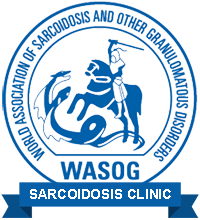Patient Reported Outcome Measures (PROMs) in Sarcoidosis
Keywords:
Sarcoidosis, Questionnaires, Patient reported outcome, PROM, PRO, Clinical trial, Clinical assessmentAbstract
Patients with sarcoidosis present with a variety of symptoms which may impair many aspects of physical and mental well-being. Traditionally, clinicians have been concerned with physical health aspects of sarcoidosis, assessing disease activity and severity with radiological imaging, pulmonary function and blood tests. However, the most reported symptom of sarcoidosis patients, fatigue, has been shown not to correlate with the most commonly used parameters for monitoring disease activity. Studies have shown poor agreement between physicians and patients in assessing sarcoidosis symptoms. This underlines the importance of patient reported outcomes (PROs) in addition to traditional outcomes in order to provide a complete evaluation of the effects of interventions in clinical trials and everyday clinical assessment of sarcoidosis. We have undertaken a systematic review to identify and provide an overview of PRO concepts used in sarcoidosis assessment the past 20 years and to evaluate the tools used for measuring these concepts, called patient reported outcome measures (PROMs). Various PROMs have been used. By categorizing these PROMs according to outcome we identified the key PRO concepts for sarcoidosis to be Health Status and Quality of Life, Dyspnea, Fatigue, Depression, Anxiety and Stress and Miscellaneous. There is no perfect sarcoidosis-specific PROM to cover all concepts and future intervention studies should therefore contain multiple complementary questionnaires. Based on our findings we recommend the Fatigue Assessment Scale (FAS) for assessing fatigue. Dyspnea scores should be chosen based on their purpose; more research is needed to examine their validity in sarcoidosis. The Modified Medical Research Council Dyspnea Scale (MRC) can be used to screen for dyspnea and the Baseline Dyspnea Index (BDI) to detect changes in dyspnea. We recommend The World Health Organization Quality of Life assessment instrument (WHOQOL-100) for assessing quality of life, although a shorter questionnaire would be preferable. For assessing health status we recommend the Sarcoidosis Assessment Tool (SAT), and have great expectations for this new and promising assessment tool. Supplementary to the WASOG meeting of 2011’s recommendation on assessing QoL, we recommend incorporating fatigue, dyspnea and HS assessment in clinical trials and everyday clinical assessment of sarcoidosis.
Downloads
Published
Issue
Section
License
This is an Open Access article distributed under the terms of the Creative Commons Attribution License (https://creativecommons.org/licenses/by-nc/4.0) which permits unrestricted use, distribution, and reproduction in any medium, provided the original work is properly cited.
Transfer of Copyright and Permission to Reproduce Parts of Published Papers.
Authors retain the copyright for their published work. No formal permission will be required to reproduce parts (tables or illustrations) of published papers, provided the source is quoted appropriately and reproduction has no commercial intent. Reproductions with commercial intent will require written permission and payment of royalties.

This work is licensed under a Creative Commons Attribution-NonCommercial 4.0 International License.








